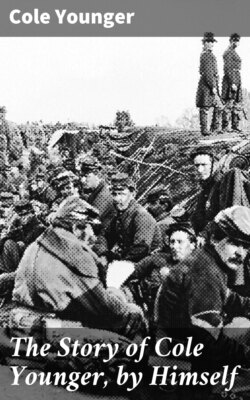Читать книгу The Story of Cole Younger, by Himself - Cole Younger - Страница 7
На сайте Литреса книга снята с продажи.
12. Quantrell on War
ОглавлениеTable of Contents
After the Lone Jack fight, Capt. Quantrell had joined Gen. Shelby at Cane Hill, Arkansas, but shortly left his command to go to the Confederate capital at Richmond to ask to be commissioned as a colonel under the partisan ranger act and to be so recognized by the war department as to have any protection the Confederate States might be able to afford him. He knew the service was a furious one, but he believed that to succeed the South must fight desperately.
Secretary Cooper suggested that war had its amenities and refinements and that in the nineteenth century it was simply barbarism to talk of a black flag.
“Barbarism,” rejoined Quantrell, according to Senator Louis T. Wigfall, of Texas, who was present at the interview, “barbarism, Mr. Secretary, means war and war means barbarism. You ask an impossible thing, Mr. Secretary. This secession or revolution, or whatever you call it, cannot conquer without violence. Your young Confederacy wants victory. Men must be killed.”
“What would you do, Captain Quantrell, were yours the power and the opportunity?” inquired the secretary.
“Do, Mr. Secretary? I would wage such a war as to make surrender forever impossible. I would break up foreign enlistments by indiscriminate massacre. I would win the independence of my people or I would find them graves.”
William Clarke Quantrell
“What of our prisoners?”
“There would be no prisoners,” exclaimed the fiery captain. “Do they take any prisoners from me? Surrounded, I do not surrender; hunted, I hunt my hunters; hated and made blacker than a dozen devils, I add to my hoofs the swiftness of a horse and to my horns the terrors of a savage following. Kansas should be laid waste at once. Meet the torch with the torch, pillage with pillage, slaughter with slaughter, subjugation with extermination. You have my ideas of war, Mr. Secretary, and I am sorry they do not accord with your own or with the ideas of the government you have the honor to represent so well.”
Disappointed, Capt. Quantrell left without his commission. He had felt the truth of his fiery speech.
Our tenders of exchanges of prisoners had been scorned by the officers of the militia. There was a boy who was an exception to this rule, to whom I want to pay a tribute. He was a young lieutenant from Brown county and if my memory serves me right, his name also was Brown. We had taken him prisoner at Olathe.
At Leavenworth they had one of our boys named Hoy, who had been taken at the Tate house, and we paroled Brown, and sent him to Leavenworth to ask the exchange of Hoy.
Brown went, too, and was laughed at for his earnestness. Exchange was ridiculed. “You are free,” they said to him, “why worry about exchanges?”
But Brown had given his word as a man and as a soldier and he came back to our camp and surrendered. He was told to return to the lines of his own army, and given safe conduct and money to provide for his immediate wants, but he vowed he would never fight again under his country's flag until he had been exchanged in accordance with his parole.
There was a cheer for that man when he left the camp, and anyone who had proposed shooting him would himself have been riddled.
